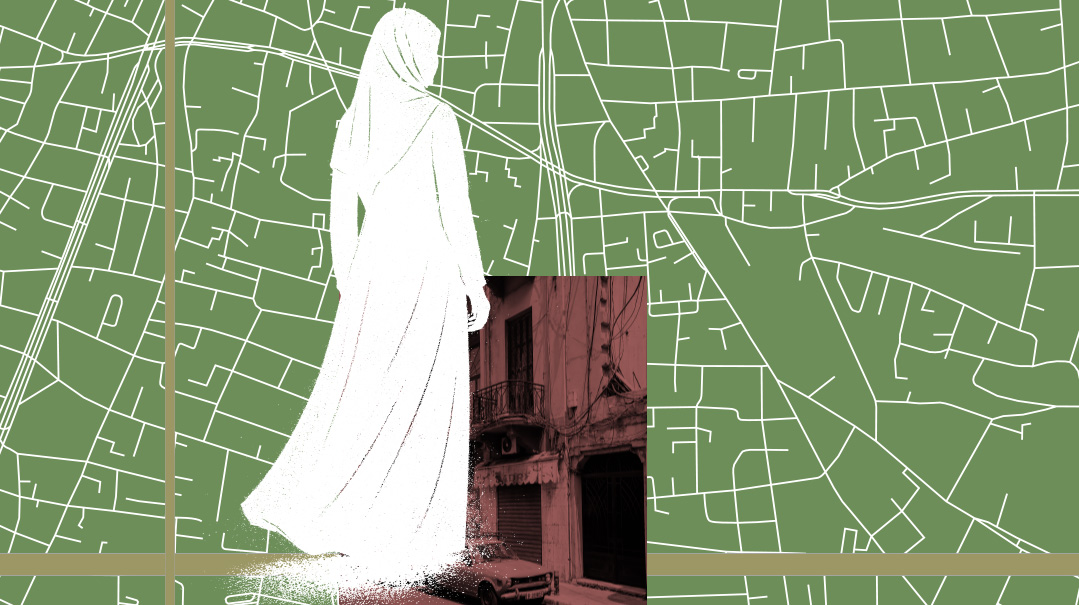Right on Time?
| September 12, 2023What are we really doing all day? A group of seven women, ages 20 to 65, decide to find out just where the time goes
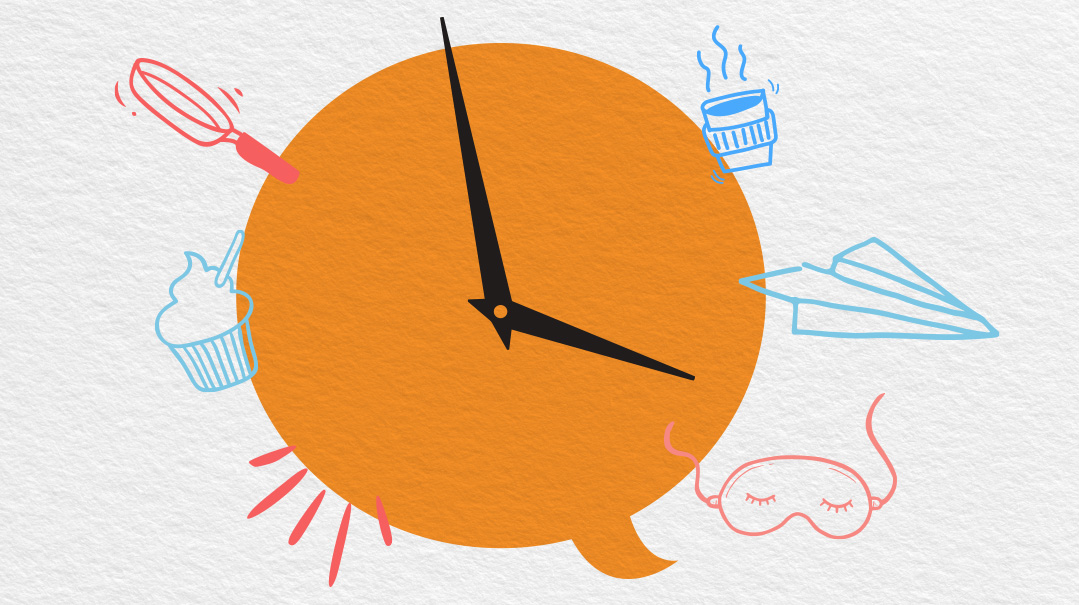
ITwas Elul, when introspection is the name of the game. Now, I know I have a lot of faults, which I’m not going to list here, but I wondered: is time-wasting one of them? I think of myself as organized; I get done what I need to, and the other night, I even went on a bike ride with some friends.
On the other hand, when I looked at the dishes that pile up a minute after I finish cleaning the kitchen, I despaired of ever being able to stay on top of things. Was this all an excuse? We’re all busy and things take time, but I wanted to know: How busy am I really? When I complain that I’m chained to my desk for five hours a day, am I really doing nothing but work during that time? I tell you that being chained to my desk for so many hours is the reason my laundry still isn’t folded — but are there hours (pockets?) during the day in which I could get everything put away but have other excuses? I wanted to find out.
Well, there is no better time to find out than during Elul, when we’re actively trying to be better. And why not do this among friends? A shared burden is always easier to carry.
I put together a group of seven women between the ages of 20 and 65 — and in Israel. And I set out to find out: What do we really do with our time? This was a four-day intensive project, when I sent multiple emails a day to each participant. In each of these emails, I asked four questions: 1) What time did you receive this email? 2) What were you doing when you received it? 3) What did you want/were supposed/had set out to be doing at this time? 4) What, if anything, has receiving this email at this time done for you?
The Participants
Shevy Teicher, 22, Lakewood, NJ:
I’m married for three years, and I currently live in Lakewood. I work as a first-grade boys’ teacher, but I’m currently on maternity leave with my second baby. In general, I’m a very scheduled person; I like to know what has to be done for the day and I love having lists. I was very excited to join this experiment because I was curious to see whether I really don’t have time for all the things I say take so long to do.
Aviva Lison, 35, Detroit, MI:
(That’s me.) I live out of town, have a large family kein ayin hara, and I work. Too much, according to my kids, and guess what? I agree. My hours are flexible, which is great, but on the other hand, it means they don’t really ever end. And I work from home, which is also great, but it’s hard to balance work time versus non-work time when your computer is five feet away from your kitchen table. The week of this experiment saw a big project on a tight deadline; as much as I don’t wish it, I knew there would be overtime. To top it off, we did this during the wonderful week between camp and school, when in addition to my own family home, my children were running two (yes, I’m a masochist) day camps in the house. That said, I don’t think of myself as a big time-waster, and I was interested in whether this will corroborate or contradict that notion.
Esty Stern 30, Lakewood, NJ:
I have six children and a pretty intense job. My job requires a lot of hours, but those hours aren’t specific, so my daily schedule fluctuates. Living in Lakewood, I spend around an hour and a half in the car each day for babysitting drop-off and pickup, but I probably only drive five miles in that time.
Shaina Goldstein, 38, Israel: I’m the mother of seven children bli ayin hara, ranging in ages from 13 down to one year. I work 20 hours a week mostly from home. I did this experiment during school vacation, so I had all my children home with me and my schedule wasn’t as structured as it usually is. I tried to fit in four hours of work in between toilet training my three-year-old, keeping up with regular household duties, and doing some sort of fun activities with the other kids.
Chani Ritterman, 45, Lakewood, NJ:
I am a young(ish) mother with old(ish) kids. I work a full-time job out of the house, and then come home to another full-time job, plus — mothering. And don’t forget wife and housekeeper!
As an even younger mother, I would look at older women (mid-forties) and think about how much time they have... no babies, no diapers, no constant running after two-year-olds… They must be bored, I thought. Now that I’ve reached that point, I can’t figure out if I’m still not old enough (my five elementary-school-aged kids keep me very busy) or organized enough. Or maybe I was just wrong, and I’ll be busy forever.
I’m pretty organized and disciplined — or so I thought. When I dealt with young kids only, the laundry got done, supper was made, the homework, bath, bed, repeat schedule was basically set in stone. But as my kids get older, I find myself forgetting to do things, running out of time... and seeming to be very disorganized. Is it me? Or is there really not enough time in the day to deal with a sixth grader who needs something for a project now while simultaneously dealing with shidduchim, shopping with a teenager, and staying on top of regular laundry, housekeeping, and homework. And yeah, work.
Liz Rothstein, 53, Baltimore, MD:
I’m a very organized person who likes to keep busy. Summers are extra hectic for me as my kids are home more than during the school year. I’m pretty disciplined with my time so I can take care of my family’s needs. I have four children; daughters who are 15, 17, and 19, and a son who is 21. My son made aliyah two and a half years ago, and he is currently enlisted in the IDF. He’s allowed to come home for 30 days a year during his service, and that time overlapped with this experiment. At the same time, I was getting my 19-year-old ready for college in New York, as well as a family vacation to Florida. Four days in the summer look very different from four days during the winter! I’m a retired attorney and currently a full-time homemaker. I like to be occupied, so I spend my free time doing volunteer work in the community and engaged in hobbies such as reading, brisk walking, and needlepointing. I love to cook and bake for my family as well.
Judy Schwartz, 65, Brooklyn, NY:
I’m a chassidic married mother and grandmother. I strive to do at least one good thing every day that I don’t tell anyone about... I seek opportunities to help others in genuine need. But my priorities are always my children.
My daily schedule involves driving a lot while listening to a shiur, chesed, enjoying my children, grandchildren, and friends, while sometimes... cooking, cleaning, and doing laundry. (I never have laundry floating around. I do a load without thinking too much about it.) Everyone always asks me what I do. My answer is always that I do mitzvos. No matter what I’m busy with, it’s always doing something good for someone. Every minute we have is a gift. I try to live my life making the most of every minute.
The Play-by-Play
I started by creating emails and scheduling them to go out. Thinking of different subject lines turned out to be very hard, but also a lot of fun. And my open rate was 100 percent. Want me to write your next email sequence? Contact me via Family First.
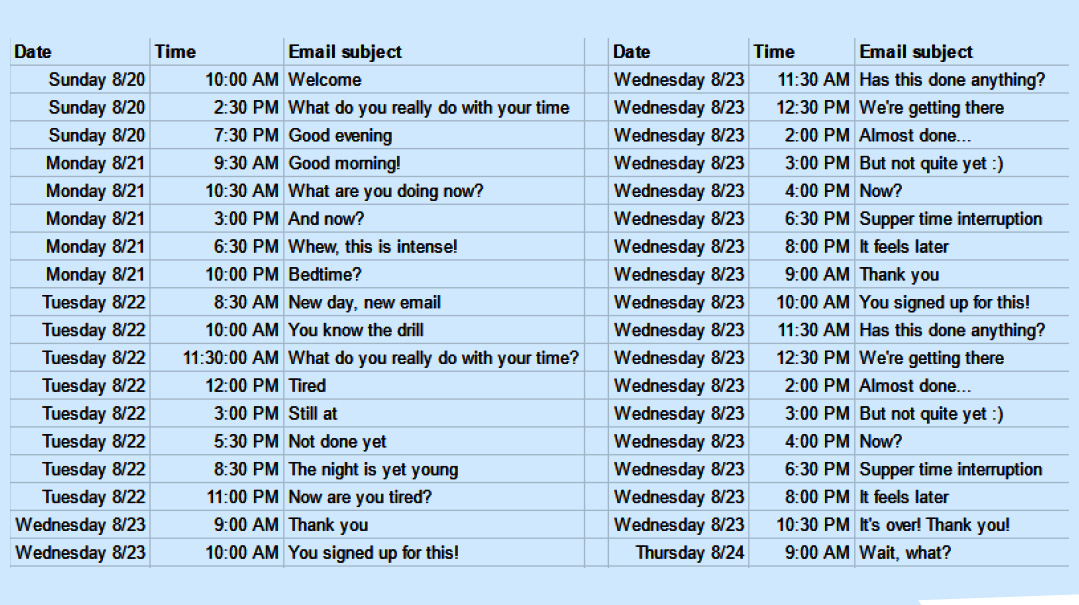
The fun started Sunday morning, but it turns out that we had to wait a bit. Did you know that, unlike Gmail, Outlook doesn’t send out scheduled messages if you don’t have the program opened? That was a time-waster right there, but I finally got it set and rolling. It was strange, because I was the one who’d scheduled the emails, so I was almost waiting for them, but here and there I forgot about a couple (that was the point!), so those were a surprise. And then there was the one I forgot to “schedule”; it was sent right when I wrote it. Did the other participants know? If they checked my time-log they did!
(That was the best part of this: checking out everyone else’s log. How do they spend their time?)
It was fun also to see who responded right away, and who had to go back and remember what they were doing, when. I’m basically chained to my desk during work hours, and it turns out everyone else leads such exciting lives. Swimming at 10 a.m., taking a ride on the ferry, driving to and from simchahs? I’ll give you a hint: I didn’t log that.
The main thing I got out of this was seeing how productive and happy we are as a control group. Most of the time we were doing exactly what we should have been doing, and no matter when I scheduled the emails to go out, the biggest change we got was “taking one less spoon of ice cream,” or “this email reminded me that I should eat.” As one of our participants wrote, “This made me realize maybe I’m not as bad at time management as I thought I was. I just have a crazy life.” Don’t we all, baruch Hashem.
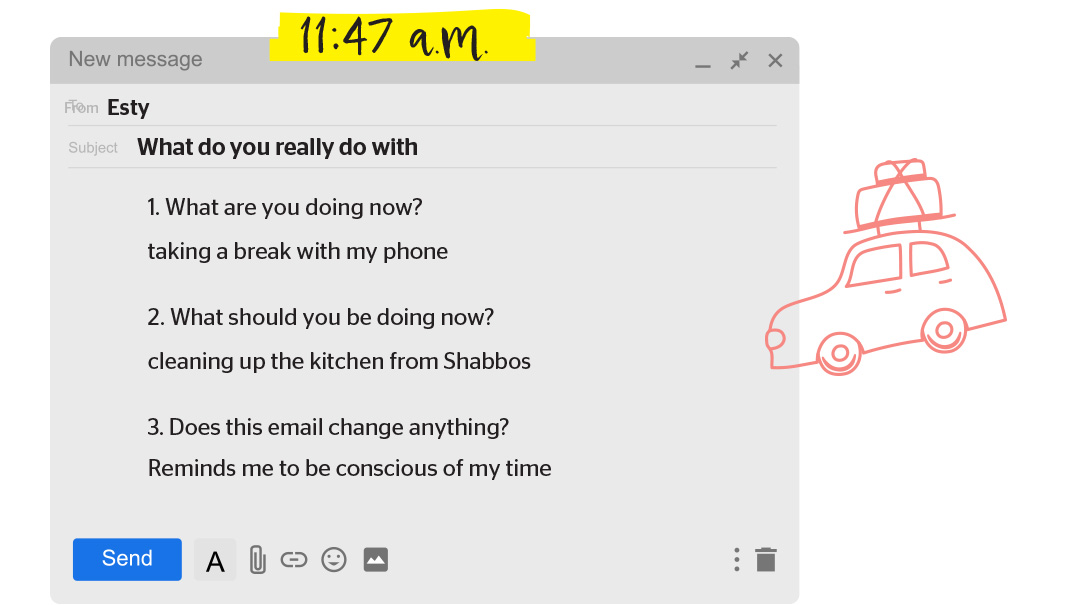
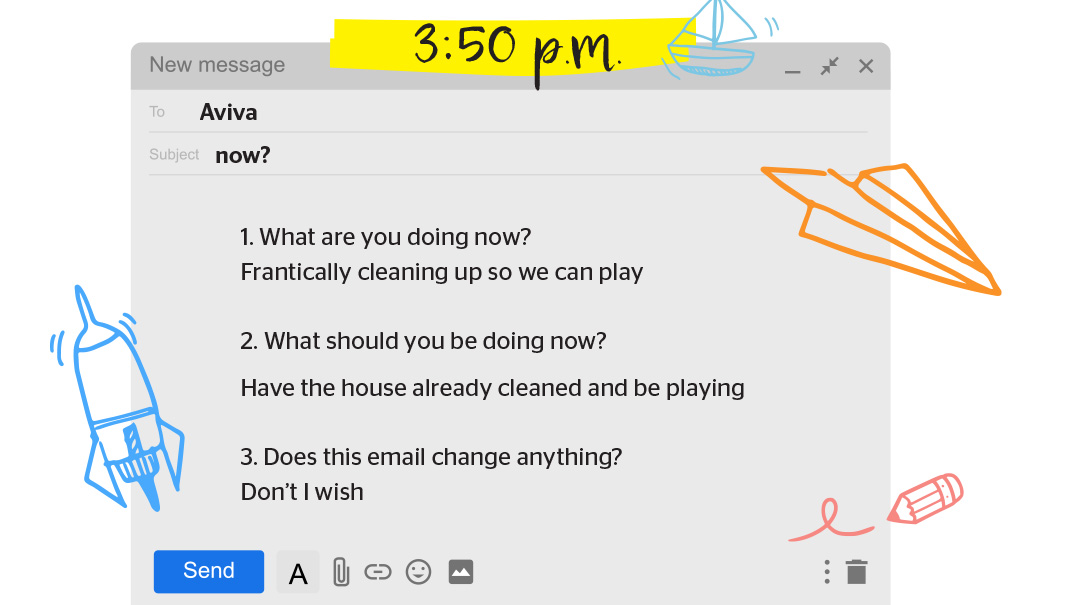
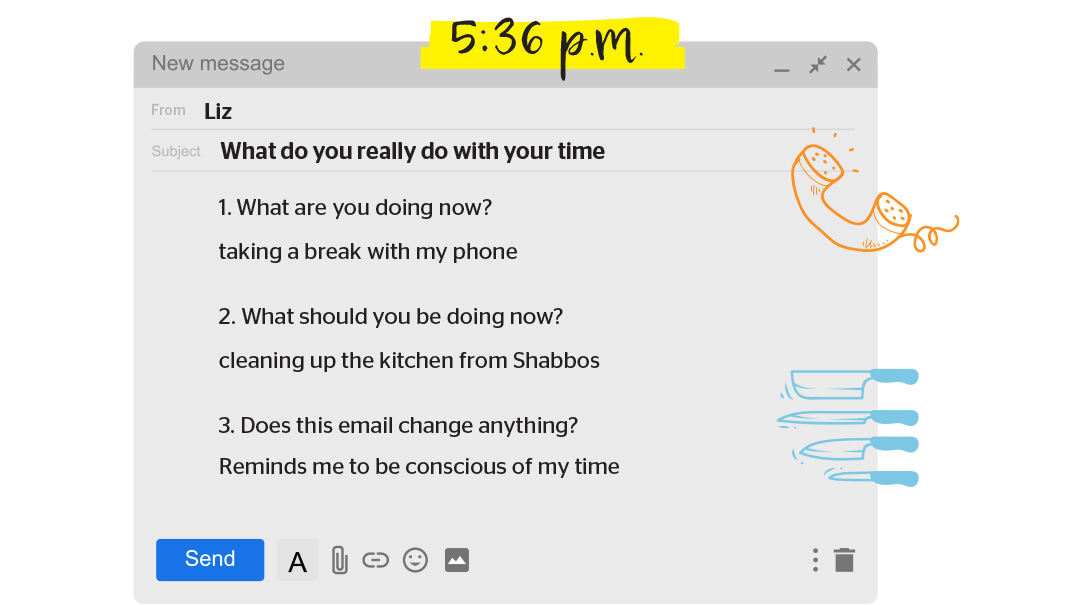
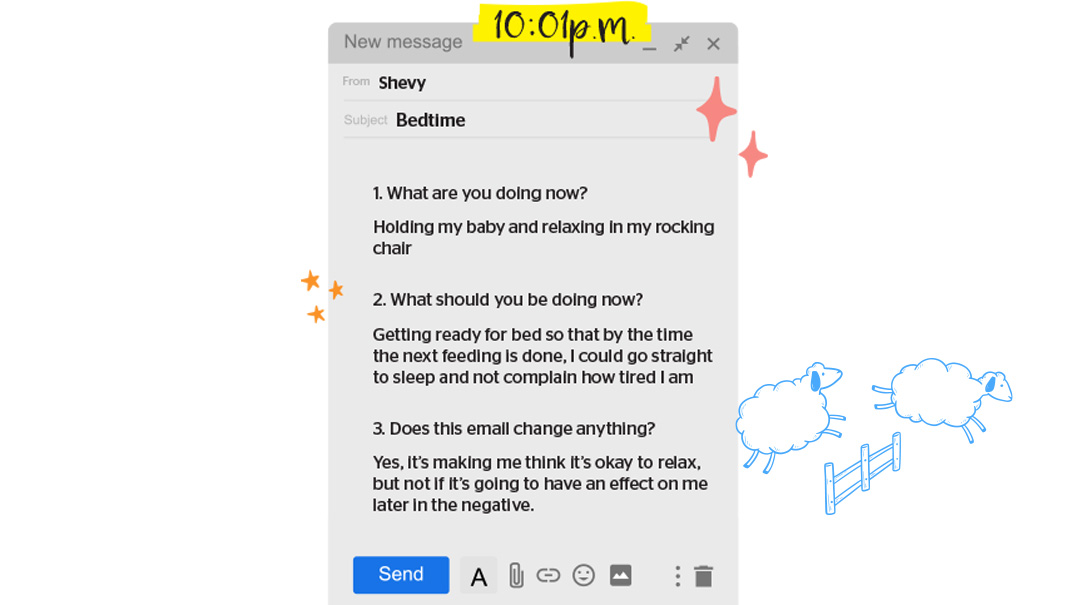
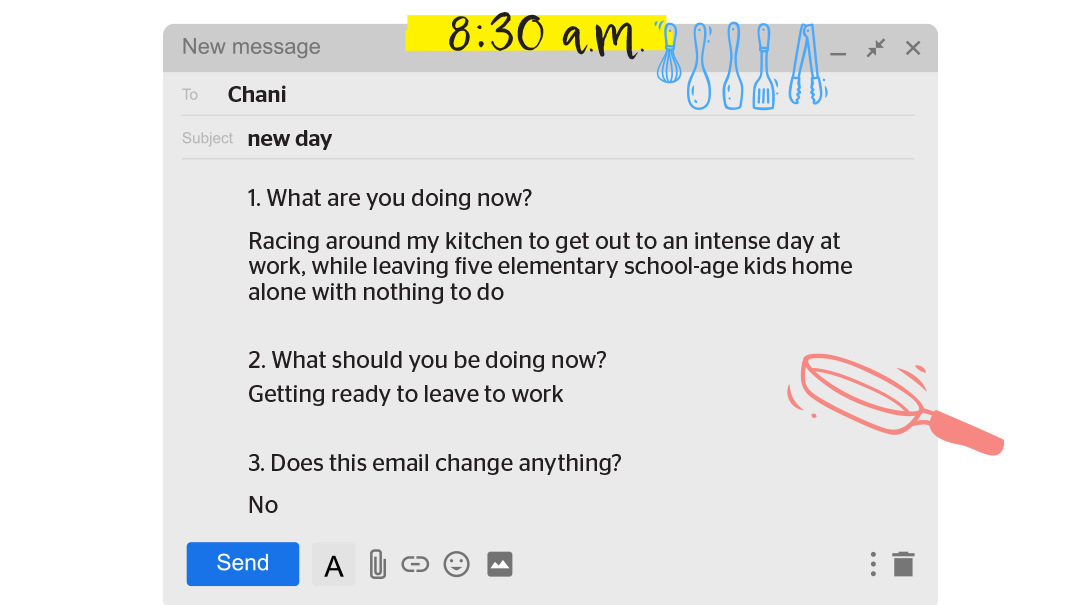
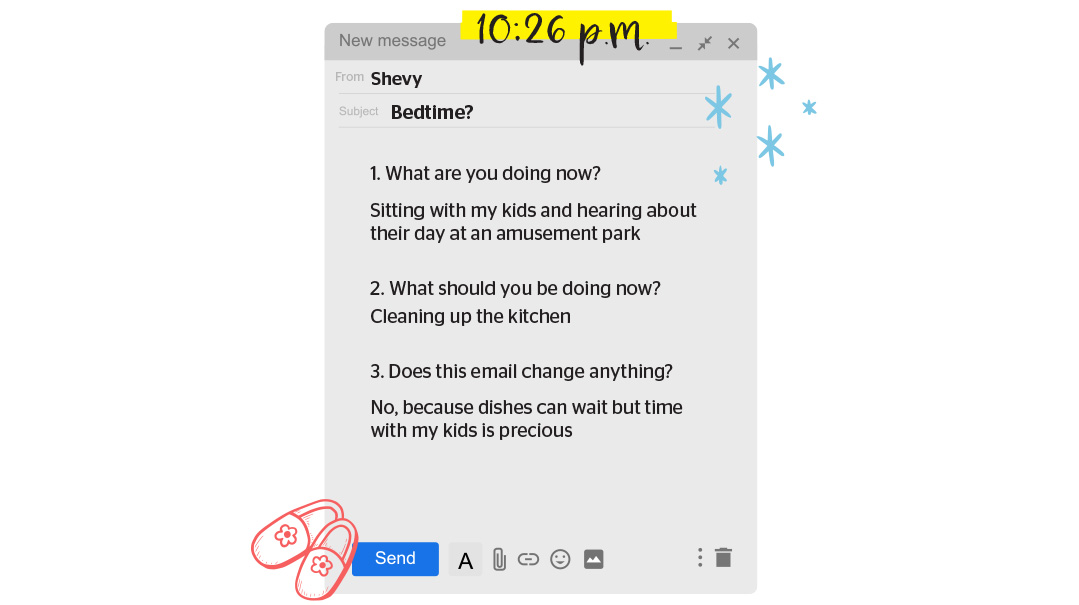
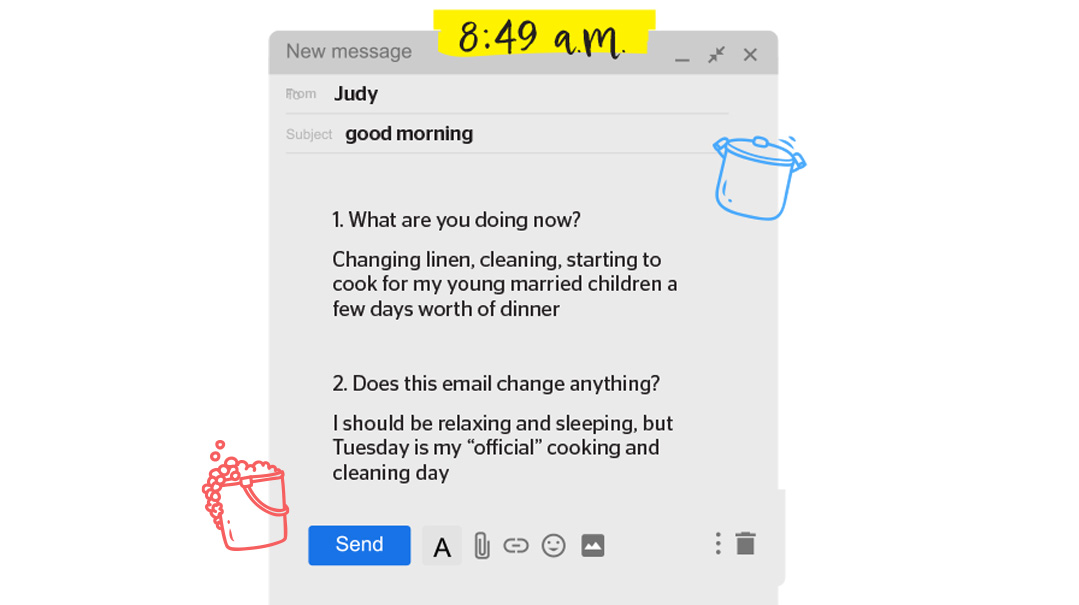
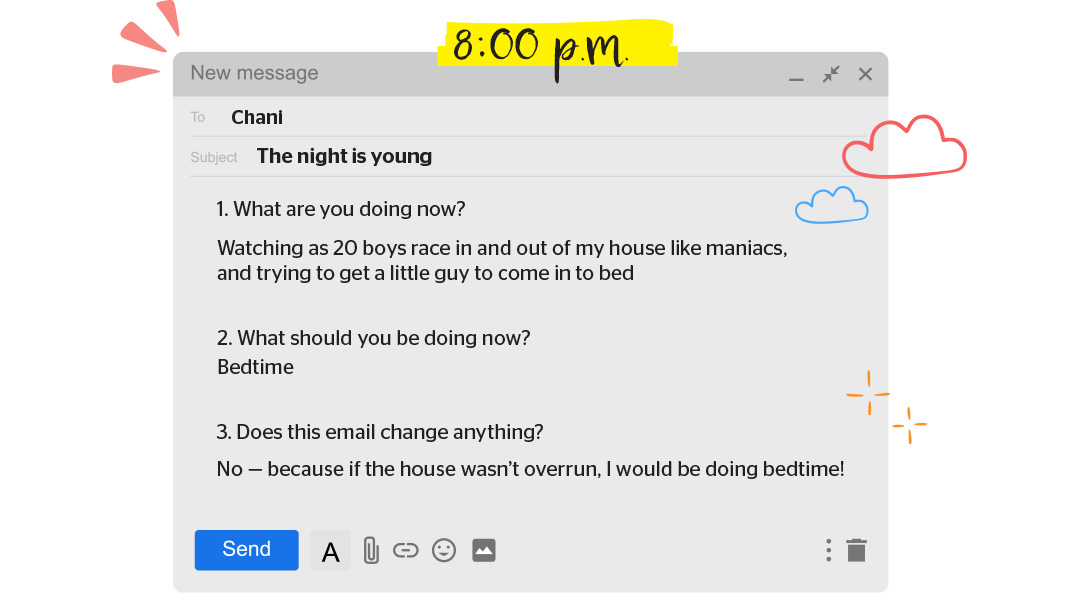
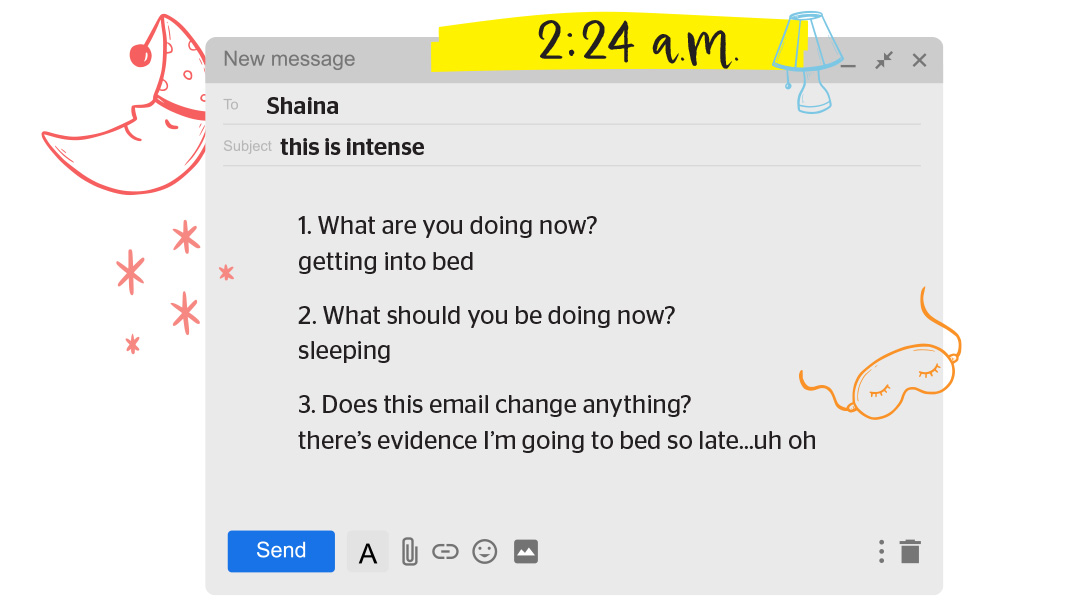
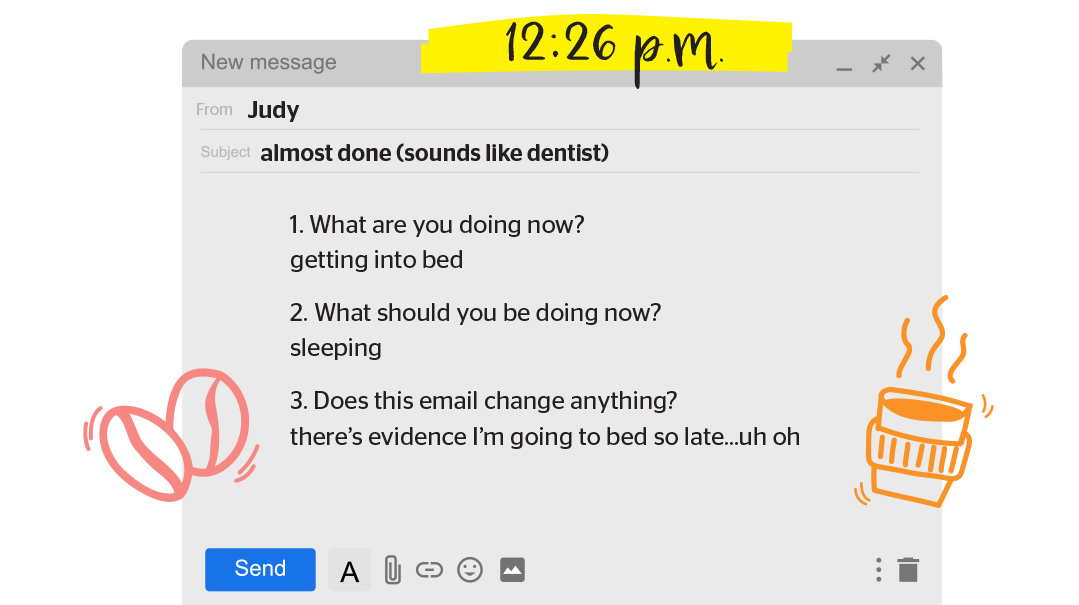
The Takeaways
At the end of the week, I sent out one more email, asking my new friends what they thought of the experience. In a shocking departure from the four questions they were expecting, the email asked:
What were you looking to get out of this?
Did this experiment do anything for you?
Did it do what you expected?
What did you get out of it?
Do you think you are going to do anything differently based on your experience this week?
Shevy:
I don’t think I’ll change what I do during the week, but this experiment definitely made me think that I can be more chilled about what has to happen. When everything that’s important enough gets done at its appropriate time, allow yourself to relax and take the day as it comes.
Esty:
Really, what I wanted to get out of this experiment was to track how much time each day I waste on my phone. I was happy to see it was less than expected. Now that I have this positive boost, I’m going to try to limit my phone usage even more! It was also really fun to peek at the other tabs and see what other people were up to.
Aviva:
What I wanted most was to see if I was really working during all my working hours — or was I stopping to change diapers and throw in a load? The good news is, I earn my paycheck. The bad news is that I’m probably not getting paid enough.
Shaina:
I was hoping this experiment would completely change my life. It didn’t, mostly because for that I would need a personality transplant. But it did two things: 1) it showed me that I do a lot every day, and 2) that while I have a tendency to procrastinate, a solution to that is to have some sort of accountability system, which Aviva’s emails provided. Because of her emails, I pushed myself to get on with things, and this week I did dishes and laundry on a regular basis, so there wasn’t this massive pileup like there often is, and I made a really good supper three times in one week, which is record-breaking, especially for summertime.
Post-experiment, I’d like to make a spreadsheet for myself to check in every few hours and see if I’m doing what I should be doing. I think being held accountable for my time in this gentle way is really helpful for me.
Chani:
I thought that this project may help me figure out why I feel like my head isn’t big enough to hold all of the things it needs. At the end of the week, I came to the conclusion that I’m still organized and structured, but with my heavy work schedule combined with a very busy home life, it isn’t really possible to get everything done exactly on time, always. I didn’t find that I was wasting time. Phew!
But I do wonder if this project would have been better done with a daily question of, “What were you planning to accomplish today?” like a to-do list, and then a nightly check-in: “Did you accomplish what you’d wanted today?” and asking us to explain why not (too much on the list, wasted too much time, forgot where you put the list…). Even at work, there might be a project that keeps getting pushed off, and it would be helpful to look back and see the reasons for it.
Liz:
Participation in this experiment was both fun and insightful. The exercise forced me to stop and think about how I was using my time at that moment and reflect on whether I was using it in the most efficient way. I usually just go through my day checking off things on my to-do list. However, taking a brief pause every few hours throughout the day caused me to put more thought into my day and how I choose to fill it. I would stop and think about what I was doing instead of just doing.
Taking that moment to think about what needed to be done instead of just “go go go” helped me refocus on what is most important in the moment and what can be saved for later. I liked taking that mental review every few hours and hope to continue it through set reminders via my phone throughout my day.
Judy:
I went into this because I was curious about how others spent their time. I had no expectations of my own. But this did make me think about how we spend our time, and how it flies. It also reminded me that I still didn’t file my already extended tax return yet… among other things I had intended to do during the not-so-busy summer.
But you know how it goes. One day it’s too hot and humid, one day it’s raining, things come up….
We have our routines, and most of us just do what we have to do most of the time. Occasionally we do fun things, but not as often as we should. For instance, it would never occur to me to go to a park or sit by the water… unless someone schleps me there. Anyone?
(Originally featured in Family First, Issue 860)
Oops! We could not locate your form.






